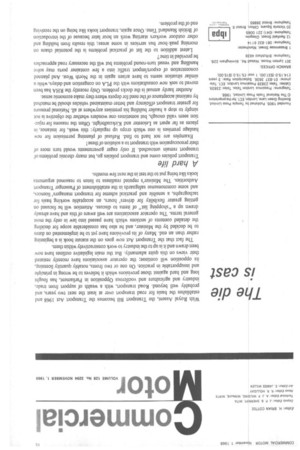The die is cast
Page 17

If you've noticed an error in this article please click here to report it so we can fix it.
With Royal Assent, the Transport Bill becomes the Transport Act 1968 and establishes the basis for road transport over at least the next two years, and probably well beyond. Road transport, with a wealth of support from trade, industry and agriculture and vociferous Opposition in Parliament, has fought long and hard against those provisions which it believes to be wrong in principle and insupportable in practice. On one or two fronts, notably quantity licensing, its opposition will continue; the operator associations have recently restated their views on this quite adamantly. But the main legislative outlines have now been drawn and it is up to the industry to work constructively within them.
The fact that the Transport Act now goes on the statute book is a beginning rather than an end. Many of its provisions have yet to be implemented on dates to be decided by the Minister, and he also has considerable scope for deciding the detailed contents of sections which have passed into law in only the most general terms. The operator associations are well aware of this and have already drawn up a "shopping list" of items to discuss. Attention will be focused on getting greater flexibility for drivers' hours, an acceptable working basis for tachographs, a sensible and practical scheme for transport managers' licences, and some commonsense safeguards in the establishment of Passenger Transport Authorities. The Minister's reputed readiness to listen to reasoned arguments looks like being put to the test in the next few months.
A hard life
Transport policies come and transport policies go, but many chronic problems of transport remain untouched. If only eager governments would turn more of their preoccupation with transport to a solution of these!
Examples are not hard to find. Refusal of planning permission for new haulage premises is one which crops up regularly: this week, for instance, in places as far apart as Leicester and Kirkcudbright. Often the reasons for rejection seem valid enough, but sometimes one wonders whether the objective is not simply to stop a haulier building his premises anywhere at all. National pressure for greater transport efficiency and better-maintained vehicles should be matched by national acceptance of the need for depots where they make economic sense.
Another hardy annual is the docks problem. Only recently the RHA has been moved to seek new consultations with the PLA on congestion and delays, while a similar situation seems to have arisen again in the North West. And planned concentration of export/import traffic into a few container ports may solve handling and vessel turn-round problems but will the necessary road approaches be provided in time?
Latest addition to the list of practical problems is the potential chaos on morning peak-hour bus services in some areas; this results from building and other outdoor workers starting work an hour later because of the introduction of British Standard Time. Once again, transport looks like being on the receiving end of the problem.




































































































